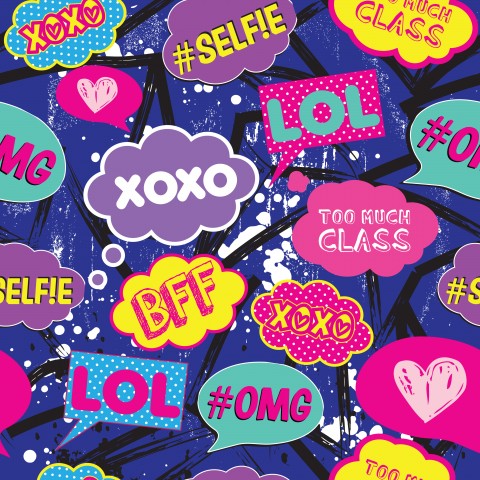
Do you use a lot of slang when you talk online or text your friends? English slang words like LOL (laughing out loud), WTF (what the f**k), BRB (be right back), and NVM (nevermind) are quite popular online and you’ve probably used them before.
Using slang is part of every culture, and every country has its own text and internet slang. The Netherlands is no exception!
As a Dutch learner, it may come in handy for you to learn some Dutch internet slang words. This will allow you to understand your Dutch friends online and impress native speakers. However, you should never use these terms in formal situations; Dutch text / internet slang is mainly used between friends.
In this article, we will…
- …discuss why learning text and internet slang is important.
- …give you more information about the culture behind Dutch text and internet slang.
- …provide you with some great examples of the most popular Dutch text / internet slang terms.
Let’s learn how to chat like a Dutch local!
 Table of Contents
Table of Contents
- Why is Text / Internet Slang Important?
- More About Text / Internet Slang in Dutch
- The Most Popular Dutch Internet and Text Slang Terms
- Famous English Slang Used by the Dutch
- How DutchPod101 Can Help You Learn More Dutch
1. Why is Text / Internet Slang Important?
So, why is it important to learn internet slang and text slang? Slang, including that which we use in our virtual communication, is a part of language. For this reason, learning about Dutch text / internet slang will help you better understand the language—not to mention it can also be a lot of fun!
Here are five key reasons why it’s important to learn about Dutch internet slang:
- Using slang saves you time.
- You can say more with fewer words.
- You learn something about another culture.
- Slang terms work like fun codes; using them shows that you’re an “insider.”
- They can help you understand the locals better.
It may be a difficult world to navigate, as you need some basic knowledge of Dutch to understand it, but it’s well worth it in the end!
2. More About Text / Internet Slang in Dutch
Before we look at specific Dutch slang expressions for texting and the internet, let’s talk a little more about what the slang scene is like in the Netherlands.
A- Slang Culture in the Netherlands
So, what about the Dutch slang culture? The Dutch love to use slang, from some pretty foul language to borrowed English words and plenty of Dutch proverbs. And let’s admit it: This doesn’t make it any easier for you to understand them. Luckily, the Dutch don’t use a lot of slang in more formal situations…but when it comes to casual interactions, you’ll just have to get used to it.
- → Still finding it hard to understand spoken Dutch? Then have a look at our vocabulary list on How to Improve Your Listening Skills.
B- How the Dutch Use Slang on the Internet and in Texts
Most Dutch slang terms used on the internet and in texts are abbreviations of other words, as the Dutch like to communicate directly and efficiently. These abbreviations are a great way to save precious time!
You can always use these internet slang words in casual situations, and some of them may even be used in certain semi-formal situations. However, avoid them in more formal settings, such as talking to your (very formal) boss online, responding to an email about a job interview, or talking to the grandparents of your Dutch partner.
3. The Most Popular Dutch Internet and Text Slang Terms
You’re now ready to master those Dutch internet / text slang words. So, where to start? With our Dutch slang dictionary, of course! Here are some of the most popular Dutch internet and text slang words you should know as a learner of the language:

1 – Wdj
Short for:
Wat doe je?
Meaning:
“What are you doing?”
How to use it in a sentence:
Wdj vanavond? / “What are you doing tonight?”
When to use it:
This Dutch text slang word is used in casual situations, such as when talking online or texting friends. It’s mainly used by younger people, but some older Dutch people may use it as well due to its efficiency. Do keep in mind, however, that it’s not the most common Dutch slang word—you may even encounter some Dutch people who don’t know it.
2 – Idd
Short for:
Inderdaad
Meaning:
“Indeed”
How to use it in a sentence:
Ik ben het daar idd niet mee eens. / “I indeed disagree with that.”
When to use it:
Inderdaad is a formal word and this is definitely the most casual way to use it. Therefore, you can use it in more casual situations as well as those that are considered semi-formal (for example, when texting with colleagues). However, don’t use it in very formal situations as you may appear lazy for not making the effort to write the whole word.
3 – Ff
Short for:
Even
Meaning:
“Briefly” / “Quickly” / “For a short time”
How to use it in a sentence:
Ik ga ff lopen. / “I am going for a short walk.”
When to use it:
This may be one of the most casual words of all! It’s mainly used by younger people in casual situations (e.g. among friends or close family). Don’t use it in more formal online contact with colleagues, as it may make you appear a bit stupid.
4 – Gwn
Short for:
Gewoon
Meaning:
“Normal” / “Just”
How to use it in a sentence:
Ik ga gwn naar school morgen. / “I’m just going to school tomorrow.”
When to use it:
Gwn is another Dutch text slang word that should only be used in the most casual situations; it’s also mainly used by younger people.
5 – Vgm
Short for:
Volgens mij
Meaning:
“I think”
How to use it in a sentence:
Vgm is het zaterdag zijn verjaardag. / “I think Saturday is his birthday.”
When to use it:
This Dutch slang word is mainly used by adults in casual or semi-formal situations. So you can use it with your family and friends and with (closer) colleagues. It’s a great way to quickly indicate that you are expressing your opinion or what you believe to be the truth.
6 – Mss / Miss
Short for:
Misschien
Meaning:
“Maybe”
How to use it in a sentence:
Hij gaat morgen miss niet mee stappen. / “He’s maybe not going out tomorrow.”
When to use it:
This word is used by young and old alike, and in both casual and semi-casual situations. Some people use miss while others use mss; they mean the same thing, but mss may be considered more casual.
7 – Wss
Short for:
Waarschijnlijk
Meaning:
“Probably”
How to use it in a sentence:
Hij komt wss morgen op kantoor om het contract te tekenen. / “He’ll probably be at the office tomorrow to sign the contract.”
When to use it:
Here’s another word that’s mainly used by adults and perfect for both casual and semi-formal situations. You can actually use this while texting or writing Dutch colleagues who you’re working with closely.
8 – Sws
Short for:
Sowieso
Meaning:
“Anyway”
How to use it in a sentence:
Ik kom morgen sws even langs. / “I will definitely come by tomorrow.”
When to use it:
This Dutch text slang word can be used in both casual and semi-formal situations. It’s quite common to use this abbreviation of the word in order to reply more quickly. However, don’t use it in the most formal situations.
9 – Suc6
Short for:
Succes
Meaning:
“Good luck”
How to use it in a sentence:
Suc6 vanavond! / “Good luck tonight!”
When to use it:
This is a very informal Dutch internet slang word, only used in casual situations. It’s used mostly by young people, but you may find some adults who still use it as well.
10 – W8
Short for:
Wacht
Meaning:
“Wait”
How to use it in a sentence:
W8, ik kom er nu aan. / “Wait, I am coming over right now.”
When to use it:
Like suc6, w8 is very informal and best for use with your friends or family. It’s used mainly by younger people, but some adults use it as well. It’s a handy abbreviation of the word wacht (“wait”), as the number 8 in Dutch is acht.

W8 is a Dutch internet slang word mostly used by kids.
11 – Wrm
Short for:
Waarom
Meaning:
“Why”
How to use it in a sentence:
Wrm reageer je niet? / “Why are you not responding?”
When to use it:
This abbreviation may seem like a perfect candidate for semi-formal situations, but it’s really a more casual way of saying waarom (“why”). Wrm is not often used in formal situations, as it has a more informal ring to it. So use it mainly with friends, family, or very close colleagues.
12 – Bijv
Short for:
Bijvoorbeeld
Meaning:
“For example”
How to use it in a sentence:
Ik kan morgen bijv wel de klant bellen. / “I can, for example, call the customer tomorrow.”
When to use it:
This is one of those words that can be used in both informal and semi-formal situations. It’s also used by both young and old, and with family, friends, and colleagues. However, as is the case with all slang words, you shouldn’t use it in the most formal interactions.
13 – Ipv
Short for:
In plaats van
Meaning:
“Instead of”
How to use it in a sentence:
Mijn moeder komt morgen eten ipv vrijdag. / “My mother is coming to dinner tomorrow instead of Friday.”
When to use it:
The official abbreviation of in plaats van is i.p.v. However, for internet and text slang purposes, people use it without the dots: ipv. This is a more informal way of using this abbreviation, but it’s still perfect for semi-formal situations (such as talking to colleagues or making an appointment with a professional) as well as casual situations.
14 – Ivm
Short for:
In verband met
Meaning:
“Due to” / “Relating to”
How to use it in a sentence:
Ivm de hoge kosten, wil ik graag mijn abonnement veranderen. / “Due to the high costs, I would like to change my subscription.”
When to use it:
As is the case with the abbreviation of in plaats van, in verband met also has an official abbreviation: i.v.m. However, it’s also used without the dots: ivm. This is a more informal way of using this abbreviation, great for semi-formal and casual situations.
15 – Iig
Short for:
In ieder geval
Meaning:
“Anyway” / “In any case”
How to use it in a sentence:
Zij gaat iig niet mee winkelen vandaag. / “She, in any case, is not going shopping today.”
When to use it:
This is a versatile word, used in both casual and semi-formal situations, by young and old alike.
16 – K / Hr / Zn / Das / T
Short for:
Ik / Haar / Zijn / Dat is / Het
Meaning:
“I” / “Her” / “His” / “That is” / “It”
How to use it in a sentence:
K ga vanavond niet met hr moeder of zn vader naar t café, das heel saai. / “I am not going to the bar tonight with her mom or his dad, that is very boring.”
When to use it:
These are all just abbreviations of some basic Dutch words that can be thrown into any Dutch internet slang sentence. However, this is a very casual way of texting or writing someone online, so save these for informal interactions with friends when you just want to send something quickly.
4. Famous English Slang Used by the Dutch

Which of the English internet slang words do the Dutch use?
The Dutch use a lot of English words in their language, including on the internet. You probably already know these words, but we’ll just show you which ones are most common in the Dutch online world:
❖ LOL
In English, it means “Laughing Out Loud.” It translates to Gieren van het Lachen in Dutch.
This word is incorporated into Dutch internet slang, but it’s mainly used by younger people and only in casual situations.
❖ WTF
In English, it means “What the f**k,” which translates to the Dutch phrase What de f**k.
This word is also incorporated into Dutch internet and texting slang, but as you can imagine, it’s only used in casual situations.
❖ YOLO
In English, it means “You Only Live Once.” It translates to Je Leeft Maar Één Keer in Dutch.
This English slang term is mainly used by younger people and only in casual situations.
❖ OMG
In English, it means “Oh My God.” In Dutch, it translates to Oh Mijn God. As the Dutch also say oh mijn god quite a lot, this abbreviation may also come from the Dutch version.
This one is also used mainly by younger people and should only be used in casual situations (e.g. among friends or close family).
- → Would you like to learn some more Dutch texting slang? Have a look at this vocabulary list from DutchPod101: Most Common Texting Slang.
5. How DutchPod101 Can Help You Learn More Dutch

Let’s master these Dutch text slang words together!
- → Would you like to learn some other Dutch words about technology? Make sure to visit our vocabulary lists on the Top 20 Words You’ll Need for the Internet, Words and Phrases for Using Your Smartphone, Talking About YouTube, and Technology.
In this guide, you’ve learned everything about Dutch slang words for texting and the internet. You should have a better idea of why it’s important to learn about Dutch text / internet slang, how the Dutch use it, and what exactly typical slang usage looks like. While you may have known some of these already, you now have them conveniently gathered in one place!
Can you think of any more slang words? What else would you like to learn about Dutch internet slang?
Would you like to improve your Dutch so that you can really make use of these Dutch slang words? Have a look at DutchPod101’s vocabulary lists with audio recordings and other free resources to boost your studies. With DutchPod101, you can keep your Dutch learning fun and diverse.
Remember that we also offer a Premium PLUS service with personal one-on-one coaching: MyTeacher. Let your private teacher help you with your grammar, vocabulary, verbs, pronunciation, and much more. You’ll receive personalized exercises, constructive feedback, and interactive assignments.
Suc6 with learning Dutch on DutchPod101.com!










